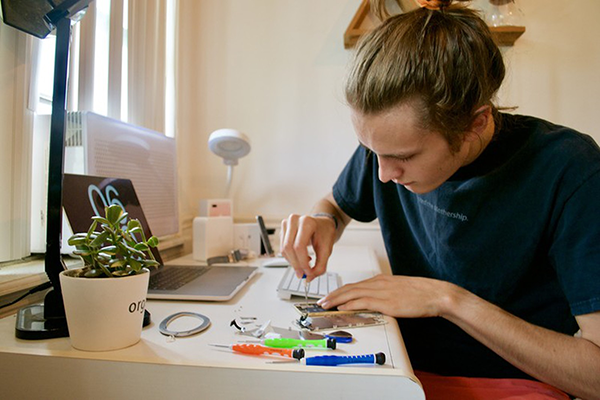University of Louisiana at Lafayette student Joseph Kokenge gave his high school computer science assignments, by his own admission, considerably more attention than other subjects.
“I found myself wanting to do more computer science homework, and trying to find ways to get around doing social studies, science and math homework. So, I told myself, ‘You know what, I enjoy doing this so much I should probably pursue this in college,” Kokenge said with a laugh.
The 21-year-old senior at UL Lafayette is majoring in computer science, with a concentration in big data and cloud computing.
He evidently made the right choice, according to Apple. The technology company has named Kokenge among 350 students from 41 countries as winners of its Swift Student Challenge. The challenge is held in conjunction with the Apple 2020 Worldwide Developers Conference, which begins today.
It requires tens of thousands of students who enter to develop a virtual environment on Apple’s Swift Playground app. The app teaches users how to code, which is the process of creating instructions for computers using programming languages.
Kokenge created the “Secure Hashing Algorithm Crash Course,” a virtual playground focused on cybersecurity. Hashing involves using algorithms to convert passwords into a “hash,” a string of characters that helps keep passwords secure.
The playground offers another feature for an added measure of security. “It basically walks someone through how to go from just having a password that’s hashed, to what’s called ‘salting the password.’”
“You basically add few random letters at the end, and that makes the password a lot harder to crack,” he explained.
The Swift Student Challenge isn’t the first time Kokenge's technological acumen has earned notice.
At age 18, he was featured in a Wall Street Journal article about entrepreneurial teenagers making big bucks by repairing iPhones. Kokenge, who watched YouTube videos to learn the process, charged anywhere from $50 to $200 to repair cracked phone screens.
He has also developed several applications that have been published on the App Store, Apple’s digital distribution platform. One of his apps enables people to submit prayer requests and get matched with another person with whom they will pray for 24 hours.
His latest, which was published last week, is called Dinner Decider. It enables groups of people to come up with a data-driven, anonymous consensus as to where the majority wants to dine.
Based on information inputted by group members – such as where each person is located, how far each is willing to travel and food preferences of each – the app compiles a list of potential restaurants.
Group members then rank the choices, and the app determines the best spot based on the feedback. “People are often reluctant to share their preferences verbally, so the app is designed to provide a way around that,” he explained.
Kokenge, who anticipates graduating in Spring 2021, plans to work for a small computer company to “get experience and learn,” then would like move on to a larger one such as “Apple, Google, or Microsoft.”
“Ultimately, my dream job would be to have my own company with some kind of new technology product, whether that means a new app, a new piece of hardware, whatever it may be,” he said.
Learn more about Apple’s Swift Student Challenge.
View Kokenge’s “Secure Hashing Algorithm Crash Course” and other projects at his website.
Photo caption: Joseph Kokenge, a senior computer science major at UL Lafayette, is one of 350 students from 41 countries who were recently named winners of Apple’s Swift Student Challenge. Photo credit: Submitted photo
